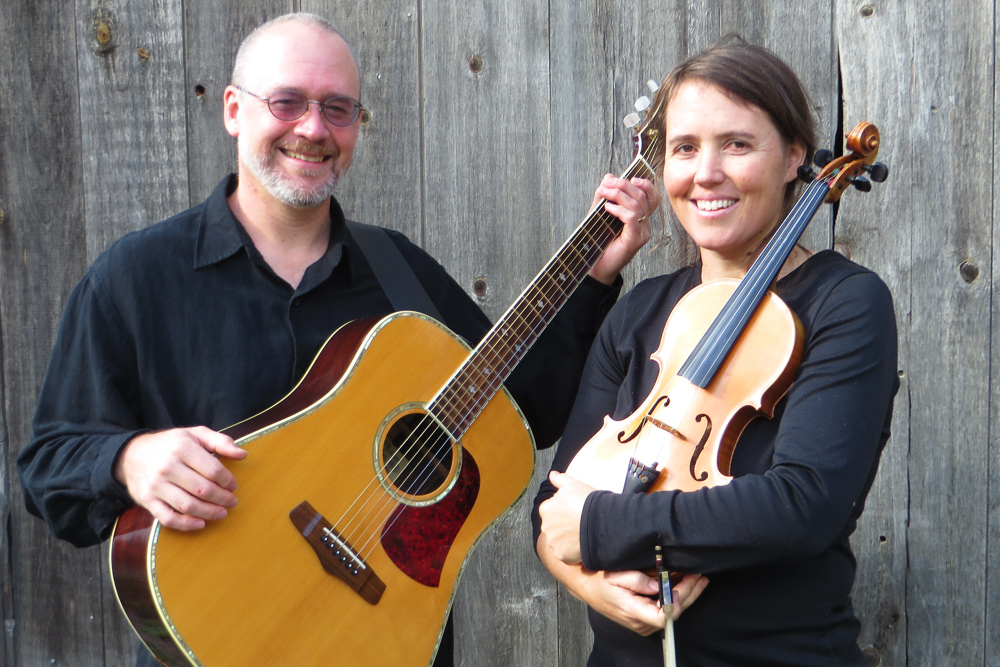The destructive forces of wind, flood or machete do not defeat the resilient Haitian reed wozo. Instead, they only make way for it to grow back stronger.
There’s even a proverb that Daryl Snider learned in his years of service in Haiti: “We are wozo. We bend, but we do not break.”
It’s also what Snider and Frances Crowhill Miller call their music- and story-based performances that explore grief and loss, trauma healing, resilience, restorative justice, and structural justice and the legacy of colonialism. They first performed Wozo: Songs for Resilience in 2014, and released a CD with that title in 2015.
The Pennsylvania duo perform as Sopa Sol. They both sing, and Miller plays hang and violin and Snider guitar, sax, oboe and akogo. In January they join Nathan Bontrager and Professor Emeritus Ken Nafziger to present two “Free Range HymnSing” events, one at 6:30 p.m. on Saturday, Jan. 5 at Chestnut Mennonite Church in Lancaster, Pennsylvania, and the other at 3 p.m. on Sunday, Jan. 6 at Community Mennonite Church in Harrisonburg.
Their Wozo project specifically grew out their time together at Eastern Mennonite University’s Center for Justice and Peacebuilding (CJP), and studies in the Strategies for Trauma Awareness and Resilience (STAR) program.
Miller earned a graduate certificate in conflict transformation in 2011, and Snider a master’s in conflict transformation in 2012.
In 2013, after Miller relocated near Snider in Lancaster County, the duo began collaborating to further incorporate their training with music. They realized that their songs fit onto STAR’s “snail model” – a spiral that shows various stops on the journey of breaking cycles of violence and building resilience.
STAR lead trainer Katie Mansfield also sees music as having that potential “to touch the specific and universal in our life experiences, and to integrate people’s embodied experience, emotions and stories,” she said. “It invites community and connection around both our traumas and our resilience, just as STAR promotes the integration of our experiences into our emerging identity as individuals and collectives.”
The Wozo album and program includes songs such as “Hole in Her Heart” that tells a story of Snider’s widowed mother’s grief: “Not even the love of ten thousand good friends / eases pain she now feels just may never end.” Other songs – such as “We Are Wozo,” from a poem by a Haitian man – tell other people’s stories: “I walk in the daytime, I walk at night / But just outside my door / Heaven’s shadow looms.”
Not all focus on brokenness and trauma; some are about reconnecting to community and finding joy. The heartening yet bittersweet “Glimmer of Sun” proclaims, “One of these mornings we shall rise / and the clouds will have broken…. / Kiss the morning sunlight / and this path you have chosen.”
And there’s humor. In “One Bad Song,” Snider sings “One bad song, my only goal / I won’t reach too far today. / One bad song, could make me whole, / at least in one small way.”
While not all Sopa Sol performances are specifically “Wozo,” many of Sopa Sol’s 40 events in the last several years contained elements of the project. As artists, they are “concerned about the musical elements of it, for sure,” Miller said, but the nature of their music means they also have to think about whether they are inviting listeners into a helpful experience.
“The music is more than just entertainment,” Snider said. “It’s important for us to take care of our audience. We want to be sure to bring people along in a careful way.”
Miller and Snider tailor each live performance to their audiences. A recent gig for a STAR course meant they could get into the “the harder stuff to look at,” Miller said, while in more general settings, they stick with songs of resilience and “letting the music do more of the work.” She said it felt like two of her songs had been “written for” one particular sexual assault prevention event; at a hospice event, a simple group ritual that the duo incorporated felt “especially poignant.”
On their part, it takes trust and hope, they said – that the perspectives, stories and emotions woven into their performances will offer “reassurance of healing and life after brokenness,” Miller said. “There’s this balance of analyzing what we are presenting, but then at the same time there’s letting go and letting music do its thing beyond what you could ever plan or imagine.”
That can be difficult – “or perhaps impossible” – to measure, said Snider. “I hope our listeners take away new understandings of the world, but I also want them to experience the event at an emotional level. Changes that occur within people at such a low, visceral level may take years and other experiences to grow, and folks may never point to our music as the catalyst or seed. Our music may be only a small part of that change, that awakening.”
Wozo’s ongoing development is balanced with the rest of their lives – they both perform individually or with other ensembles, too, and Miller has a micro-dairy and two young children – but they see Wozo as a potential resource for many different groups, such as veterans and people who are incarcerated.
“This can go many, many places as time allows,” Miller said. “But it’s a slow-cooker project.”

Great article about a great duo! Kudos to Daryl and Frances for combining their creativity and artistry to help heal hearts and souls and structures. Way to go, you two!